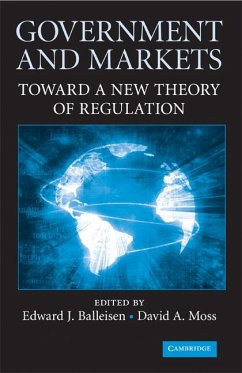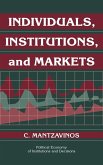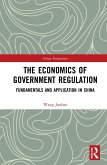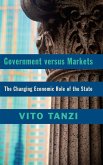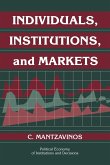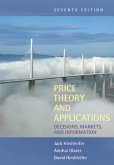- Gebundenes Buch
- Merkliste
- Auf die Merkliste
- Bewerten Bewerten
- Teilen
- Produkt teilen
- Produkterinnerung
- Produkterinnerung
This interdisciplinary volume points the way toward the modernization of regulatory theory.
Andere Kunden interessierten sich auch für
![Individuals, Institutions, and Markets Individuals, Institutions, and Markets]() Chrysostomos MantzavinosIndividuals, Institutions, and Markets58,99 €
Chrysostomos MantzavinosIndividuals, Institutions, and Markets58,99 €![The Economics of Government Regulation The Economics of Government Regulation]() Wang JunhaoThe Economics of Government Regulation200,99 €
Wang JunhaoThe Economics of Government Regulation200,99 €![Government Debts and Financial Markets in Europe Government Debts and Financial Markets in Europe]() Fausto Piola CaselliGovernment Debts and Financial Markets in Europe199,99 €
Fausto Piola CaselliGovernment Debts and Financial Markets in Europe199,99 €![Government versus Markets Government versus Markets]() Vito TanziGovernment versus Markets95,99 €
Vito TanziGovernment versus Markets95,99 €![Individuals, Institutions, and Markets Individuals, Institutions, and Markets]() C. MantzavinosIndividuals, Institutions, and Markets27,99 €
C. MantzavinosIndividuals, Institutions, and Markets27,99 €![The Romantic Economist The Romantic Economist]() Richard BronkThe Romantic Economist26,99 €
Richard BronkThe Romantic Economist26,99 €![Price Theory and Applications Price Theory and Applications]() Jack HirshleiferPrice Theory and Applications64,99 €
Jack HirshleiferPrice Theory and Applications64,99 €-
-
-
This interdisciplinary volume points the way toward the modernization of regulatory theory.
Hinweis: Dieser Artikel kann nur an eine deutsche Lieferadresse ausgeliefert werden.
Hinweis: Dieser Artikel kann nur an eine deutsche Lieferadresse ausgeliefert werden.
Produktdetails
- Produktdetails
- Verlag: Cambridge University Press
- Seitenzahl: 576
- Erscheinungstermin: 1. Dezember 2009
- Englisch
- Abmessung: 235mm x 157mm x 38mm
- Gewicht: 1075g
- ISBN-13: 9780521118484
- ISBN-10: 0521118484
- Artikelnr.: 26571746
- Herstellerkennzeichnung
- Libri GmbH
- Europaallee 1
- 36244 Bad Hersfeld
- gpsr@libri.de
- Verlag: Cambridge University Press
- Seitenzahl: 576
- Erscheinungstermin: 1. Dezember 2009
- Englisch
- Abmessung: 235mm x 157mm x 38mm
- Gewicht: 1075g
- ISBN-13: 9780521118484
- ISBN-10: 0521118484
- Artikelnr.: 26571746
- Herstellerkennzeichnung
- Libri GmbH
- Europaallee 1
- 36244 Bad Hersfeld
- gpsr@libri.de
Introduction; Part I. Beyond Market Failure: 1. Government failure vs.
market failure: principles of regulation Joseph E. Stiglitz; 2. Effective
regulation through credible cost-benefit analysis: the opportunity costs of
superfund Michael Greenstone; 3. From 'state interference' to the 'return
to the market': the rhetoric of economic regulation from the old Gilded Age
to the new Mary O. Furner; 4. Lessons from Europe: some reflections on the
European Union and the regulation of business Neil Fligstein; 5. Confidence
games: how does regulation constitute markets? Daniel Carpenter; Part II.
Beyond the Economic Theory of Politics: 6. The end of special interests
theory and the beginning of a more positive view of democratic politics
Donald Wittman; 7. Public choice: a critical reassessment Jessica Leight;
8. The paranoid style in the study of American politics David A. Moss and
Mary Oey; 9. Law, policy, and cooperation Yochai Benkler; Part III. Beyond
Command and Control: 10. What opportunity is knocking? Regulating corporate
governance in the United States Mary A. O'Sullivan; 11. Taxation as a
regulatory tool: lessons from environmental taxes in Europe Monica Prasad;
12. Redesigning regulation: a case study from the consumer credit market
Elizabeth Warren; 13. Origins and regulatory consequences of the subprime
crisis Barry Eichengreen; 14. Prospects for economic 'self-regulation' in
the United States: an historian's view from the early twenty-first century
Edward J. Balleisen; 15. Deregulation theories in a litigious society:
American antitrust and tort Tony Freyer; 16. Markets in the shadow of the
state: an appraisal of deregulation and implications for future research
Marc Allen Eisner; Conclusion.
market failure: principles of regulation Joseph E. Stiglitz; 2. Effective
regulation through credible cost-benefit analysis: the opportunity costs of
superfund Michael Greenstone; 3. From 'state interference' to the 'return
to the market': the rhetoric of economic regulation from the old Gilded Age
to the new Mary O. Furner; 4. Lessons from Europe: some reflections on the
European Union and the regulation of business Neil Fligstein; 5. Confidence
games: how does regulation constitute markets? Daniel Carpenter; Part II.
Beyond the Economic Theory of Politics: 6. The end of special interests
theory and the beginning of a more positive view of democratic politics
Donald Wittman; 7. Public choice: a critical reassessment Jessica Leight;
8. The paranoid style in the study of American politics David A. Moss and
Mary Oey; 9. Law, policy, and cooperation Yochai Benkler; Part III. Beyond
Command and Control: 10. What opportunity is knocking? Regulating corporate
governance in the United States Mary A. O'Sullivan; 11. Taxation as a
regulatory tool: lessons from environmental taxes in Europe Monica Prasad;
12. Redesigning regulation: a case study from the consumer credit market
Elizabeth Warren; 13. Origins and regulatory consequences of the subprime
crisis Barry Eichengreen; 14. Prospects for economic 'self-regulation' in
the United States: an historian's view from the early twenty-first century
Edward J. Balleisen; 15. Deregulation theories in a litigious society:
American antitrust and tort Tony Freyer; 16. Markets in the shadow of the
state: an appraisal of deregulation and implications for future research
Marc Allen Eisner; Conclusion.
Introduction; Part I. Beyond Market Failure: 1. Government failure vs. market failure: principles of regulation Joseph E. Stiglitz; 2. Effective regulation through credible cost-benefit analysis: the opportunity costs of superfund Michael Greenstone; 3. From 'state interference' to the 'return to the market': the rhetoric of economic regulation from the old Gilded Age to the new Mary O. Furner; 4. Lessons from Europe: some reflections on the European Union and the regulation of business Neil Fligstein; 5. Confidence games: how does regulation constitute markets? Daniel Carpenter; Part II. Beyond the Economic Theory of Politics: 6. The end of special interests theory and the beginning of a more positive view of democratic politics Donald Wittman; 7. Public choice: a critical reassessment Jessica Leight; 8. The paranoid style in the study of American politics David A. Moss and Mary Oey; 9. Law, policy, and cooperation Yochai Benkler; Part III. Beyond Command and Control: 10. What opportunity is knocking? Regulating corporate governance in the United States Mary A. O'Sullivan; 11. Taxation as a regulatory tool: lessons from environmental taxes in Europe Monica Prasad; 12. Redesigning regulation: a case study from the consumer credit market Elizabeth Warren; 13. Origins and regulatory consequences of the subprime crisis Barry Eichengreen; 14. Prospects for economic 'self-regulation' in the United States: an historian's view from the early twenty-first century Edward J. Balleisen; 15. Deregulation theories in a litigious society: American antitrust and tort Tony Freyer; 16. Markets in the shadow of the state: an appraisal of deregulation and implications for future research Marc Allen Eisner; Conclusion.
Introduction; Part I. Beyond Market Failure: 1. Government failure vs.
market failure: principles of regulation Joseph E. Stiglitz; 2. Effective
regulation through credible cost-benefit analysis: the opportunity costs of
superfund Michael Greenstone; 3. From 'state interference' to the 'return
to the market': the rhetoric of economic regulation from the old Gilded Age
to the new Mary O. Furner; 4. Lessons from Europe: some reflections on the
European Union and the regulation of business Neil Fligstein; 5. Confidence
games: how does regulation constitute markets? Daniel Carpenter; Part II.
Beyond the Economic Theory of Politics: 6. The end of special interests
theory and the beginning of a more positive view of democratic politics
Donald Wittman; 7. Public choice: a critical reassessment Jessica Leight;
8. The paranoid style in the study of American politics David A. Moss and
Mary Oey; 9. Law, policy, and cooperation Yochai Benkler; Part III. Beyond
Command and Control: 10. What opportunity is knocking? Regulating corporate
governance in the United States Mary A. O'Sullivan; 11. Taxation as a
regulatory tool: lessons from environmental taxes in Europe Monica Prasad;
12. Redesigning regulation: a case study from the consumer credit market
Elizabeth Warren; 13. Origins and regulatory consequences of the subprime
crisis Barry Eichengreen; 14. Prospects for economic 'self-regulation' in
the United States: an historian's view from the early twenty-first century
Edward J. Balleisen; 15. Deregulation theories in a litigious society:
American antitrust and tort Tony Freyer; 16. Markets in the shadow of the
state: an appraisal of deregulation and implications for future research
Marc Allen Eisner; Conclusion.
market failure: principles of regulation Joseph E. Stiglitz; 2. Effective
regulation through credible cost-benefit analysis: the opportunity costs of
superfund Michael Greenstone; 3. From 'state interference' to the 'return
to the market': the rhetoric of economic regulation from the old Gilded Age
to the new Mary O. Furner; 4. Lessons from Europe: some reflections on the
European Union and the regulation of business Neil Fligstein; 5. Confidence
games: how does regulation constitute markets? Daniel Carpenter; Part II.
Beyond the Economic Theory of Politics: 6. The end of special interests
theory and the beginning of a more positive view of democratic politics
Donald Wittman; 7. Public choice: a critical reassessment Jessica Leight;
8. The paranoid style in the study of American politics David A. Moss and
Mary Oey; 9. Law, policy, and cooperation Yochai Benkler; Part III. Beyond
Command and Control: 10. What opportunity is knocking? Regulating corporate
governance in the United States Mary A. O'Sullivan; 11. Taxation as a
regulatory tool: lessons from environmental taxes in Europe Monica Prasad;
12. Redesigning regulation: a case study from the consumer credit market
Elizabeth Warren; 13. Origins and regulatory consequences of the subprime
crisis Barry Eichengreen; 14. Prospects for economic 'self-regulation' in
the United States: an historian's view from the early twenty-first century
Edward J. Balleisen; 15. Deregulation theories in a litigious society:
American antitrust and tort Tony Freyer; 16. Markets in the shadow of the
state: an appraisal of deregulation and implications for future research
Marc Allen Eisner; Conclusion.
Introduction; Part I. Beyond Market Failure: 1. Government failure vs. market failure: principles of regulation Joseph E. Stiglitz; 2. Effective regulation through credible cost-benefit analysis: the opportunity costs of superfund Michael Greenstone; 3. From 'state interference' to the 'return to the market': the rhetoric of economic regulation from the old Gilded Age to the new Mary O. Furner; 4. Lessons from Europe: some reflections on the European Union and the regulation of business Neil Fligstein; 5. Confidence games: how does regulation constitute markets? Daniel Carpenter; Part II. Beyond the Economic Theory of Politics: 6. The end of special interests theory and the beginning of a more positive view of democratic politics Donald Wittman; 7. Public choice: a critical reassessment Jessica Leight; 8. The paranoid style in the study of American politics David A. Moss and Mary Oey; 9. Law, policy, and cooperation Yochai Benkler; Part III. Beyond Command and Control: 10. What opportunity is knocking? Regulating corporate governance in the United States Mary A. O'Sullivan; 11. Taxation as a regulatory tool: lessons from environmental taxes in Europe Monica Prasad; 12. Redesigning regulation: a case study from the consumer credit market Elizabeth Warren; 13. Origins and regulatory consequences of the subprime crisis Barry Eichengreen; 14. Prospects for economic 'self-regulation' in the United States: an historian's view from the early twenty-first century Edward J. Balleisen; 15. Deregulation theories in a litigious society: American antitrust and tort Tony Freyer; 16. Markets in the shadow of the state: an appraisal of deregulation and implications for future research Marc Allen Eisner; Conclusion.
Review of the hardback: 'The heritage of James Tobin is well represented by this outstanding volume. The authors analyze the relations of government and the market from many different angles, showing the fallacies of simple critiques on the basis of deep scholarship.' Kenneth J. Arrow, Stanford University

